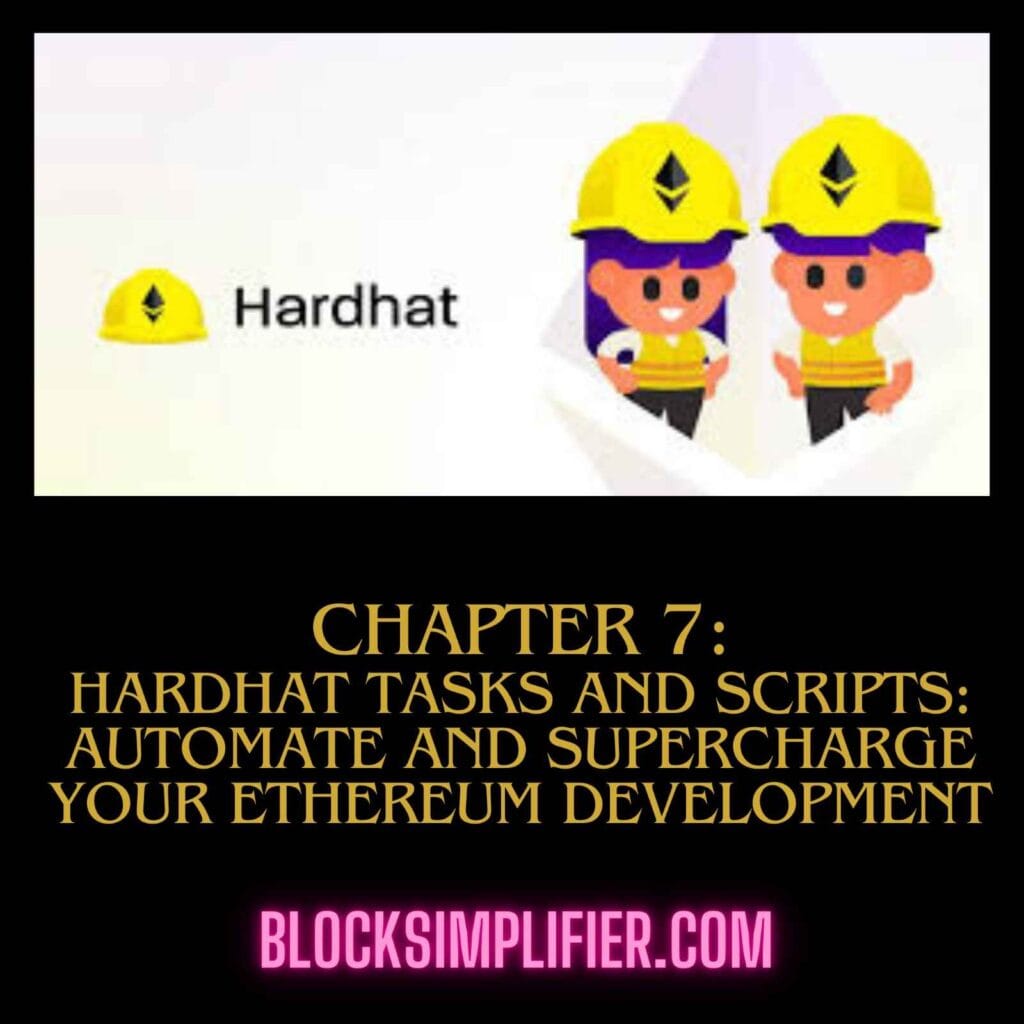Ethereum clever contract improvement is more than just writing Solidity code—it involves compiling, trying out, deploying, and interacting with contracts effectively. As projects grow in complexity, repetitive obligations like deployment, agreement interplay, and transaction monitoring end up time-ingesting.
This is where Hardhat, a effective Ethereum improvement framework, shines. Hardhat gives a flexible and extensible surroundings that permits builders to put in writing custom obligations and scripts for automation.
Table of Contents
Why is automation crucial in Ethereum improvement?
- Reduces errors: Manual deployments are prone to mistakes.
- Saves time: Automating contract interaction eliminates repetitive manual processes.
- Improves efficiency: Faster development cycles mean quicker iterations and debugging.
- Enhances collaboration: Standardized tasks ensure all team members follow the same workflow.
This guide will take you through:
- Writing custom Hardhat tasks to streamline operations.
- Automating contract deployment to improve efficiency.
- Interacting with deployed contracts programmatically using scripts.
By the cease, you’ll be capable of automate your Ethereum improvement workflow, making your dApp improvement quicker and more dependable.
Understanding Hardhat Tasks and Scripts
Before diving into code, let’s understand the difference between tasks and scripts in Hardhat.
What are Hardhat Tasks?
Hardhat tasks are command-line operations that can be either:
- Built-in (e.g.,
compile,test,deploy) - Custom-defined (created by developers to automate workflows)
Example of a Built-in Task
Running:
npx hardhat compile
compiles the Solidity smart contracts in your project.
However, if you frequently need to check contract balances or execute other repetitive tasks, custom Hardhat tasks can be useful.
What are Hardhat Scripts?
Scripts in Hardhat are JavaScript or TypeScript files that allow developers to automate actions like:
- Deploying smart contracts
- Calling smart contract functions
- Fetching blockchain data
Scripts are executed via:
npx hardhat run scripts/myScript.js --network goerli
Unlike tasks, scripts do not modify the Hardhat CLI but serve as standalone files for executing automated logic.
Writing Custom Hardhat Tasks
Why Create Custom Tasks?
- Streamline repetitive actions (e.g., checking user balances).
- Improve workflow efficiency (e.g., resetting blockchain state).
- Customize development pipelines for project-specific needs.
How to Write a Custom Hardhat Task
Custom duties are defined inside the hardhat.config.js report or in a separate script.
Example: Creating a Task to Fetch Account Balances
Modify hardhat.config.js:
const { task } = require("hardhat/config");
task("balance", "Prints an account's balance")
.addParam("address", "The account's address")
.setAction(async (taskArgs, hre) => {
const balance = await hre.ethers.provider.getBalance(taskArgs.address);
console.log(`Balance: ${hre.ethers.utils.formatEther(balance)} ETH`);
});
How to Use the Custom Task
Run it with:
npx hardhat balance --address 0xYourAddressHere
Output:
Balance: 5.1234 ETH
Use Case: Automating User Balance Checks
Instead of using a blockchain explorer or a dApp frontend, developers can quickly verify balances from the terminal.
Automating Smart Contract Deployments
Why Automate Deployments?
- Eliminates manual configuration errors
- Ensures consistency across different networks
- Speeds up testing and production deployments
Step-with the aid of-Step Guide to Writing a Deployment Script
- Create a Deployment Script (
scripts/deploy.js)
const { ethers } = require("hardhat");
async function main() {
const Token = await ethers.getContractFactory("MyToken");
const token = await Token.deploy("MyToken", "MTK");
await token.deployed();
console.log("Token deployed to:", token.address);
}
main().catch((error) => {
console.error(error);
process.exit(1);
});
- Run the Deployment Script
npx hardhat run scripts/deploy.js --network goerli
- Output Example:
Token deployed to: 0xYourTokenContractAddress
Enhancing Deployment Automation
- Use environment variables for API keys (
dotenvpackage). - Implement Hardhat-deploy plugin for structured deployments.
Interacting with Deployed Contracts via Scripts
Why Use Scripts to Interact with Contracts?
- Avoids using a frontend for testing functions
- Useful for automating transactions
- Reduces human error in high-value operations
Example: Sending Tokens Using a Script
- Modify
scripts/interact.js
const { ethers } = require("hardhat");
async function main() {
const contractAddress = "0xYourTokenContractAddress";
const abi = [
"function transfer(address to, uint256 amount)"
];
const [owner] = await ethers.getSigners();
const contract = new ethers.Contract(contractAddress, abi, owner);
const tx = await contract.transfer("0xRecipientAddress", ethers.utils.parseEther("1"));
await tx.wait();
console.log("1 Token sent!");
}
main().catch(console.error);
- Run the Interaction Script
npx hardhat run scripts/interact.js --network goerli
- Output Example:
1 Token sent!
Use Cases:
- Automating batch token transfers.
- Retrieving on-chain data (e.g., checking total supply, balances).
- Automating reward distributions in a staking contract.
Advanced Hardhat Automation Techniques
Using Hardhat-Deploy for Structured Deployments
- Handles multiple contract deployments seamlessly.
- Enables upgradeable contracts with proxy patterns.
Automating Test Execution
Run tests automatically with:
npx hardhat test
or
npx hardhat coverage # Code coverage report
CI/CD Integration for Smart Contracts
- Automate deployments via GitHub Actions.
- Prevent bugs by running tests before merging PRs.
Conclusion
Mastering Hardhat tasks and scripts unlocks powerful automation capabilities in Ethereum development.
Key Takeaways:
Custom Hardhat tasks simplify repetitive operations.
Automated deployment scripts streamline smart contract deployment.
Interacting with contracts via scripts speeds up testing and execution.
Advanced automation techniques improve efficiency and reduce errors.
Now that you know how to automate your Hardhat workflows, experiment with writing custom tasks and scripts to enhance your own blockchain development process.
FAQ: Hardhat Tasks and Scripts
1. What is the difference between Hardhat tasks and scripts?
Hardhat tasks are CLI commands that execute precise functions (e.g., checking balances). They integrate with the Hardhat CLI and can be run the usage of npx hardhat <task-name>.
Hardhat scripts are standalone JavaScript/TypeScript documents that automate actions like deploying or interacting with contracts. They are completed the usage of npx hardhat run <script-file>.
2. Why should I use custom Hardhat tasks?
Custom tasks help automate repetitive operations such as:
- Checking contract balances
- Resetting the blockchain state
- Fetching transaction details
- Batch processing token transfers
They improve efficiency, reduce errors, and streamline the development workflow.
3. How do I create a custom Hardhat task?
Modify hardhat.config.js:
const { task } = require("hardhat/config");
task("balance", "Prints an account's balance")
.addParam("address", "The account's address")
.setAction(async (taskArgs, hre) => {
const balance = await hre.ethers.provider.getBalance(taskArgs.address);
console.log(`Balance: ${hre.ethers.utils.formatEther(balance)} ETH`);
});
Run it using:
npx hardhat balance --address 0xYourAddress
4. How do I automate smart contract deployment using Hardhat?
Create a deployment script scripts/deploy.js:
const { ethers } = require("hardhat");
async function main() {
const Token = await ethers.getContractFactory("MyToken");
const token = await Token.deploy("MyToken", "MTK");
await token.deployed();
console.log("Token deployed to:", token.address);
}
main().catch(console.error);
Run the script:
npx hardhat run scripts/deploy.js --network goerli
5. Can I deploy multiple smart contracts using Hardhat scripts?
Yes! You can deploy multiple contracts within a single script by calling deploy() multiple times:
async function main() {
const ContractA = await ethers.getContractFactory("ContractA");
const contractA = await ContractA.deploy();
await contractA.deployed();
const ContractB = await ethers.getContractFactory("ContractB");
const contractB = await ContractB.deploy();
await contractB.deployed();
console.log("Contracts deployed:", contractA.address, contractB.address);
}6. What are some best practices for Hardhat automation?
Use environment variables for private keys (dotenv package).
Separate scripts for deployment and interaction for better maintainability.
Implement unit tests before deploying contracts.
Use Hardhat-deploy plugin for structured deployments.
Integrate Hardhat with CI/CD pipelines to automate testing and deployment.
7. Can I use TypeScript instead of JavaScript for Hardhat scripts?
Yes! Install TypeScript dependencies:
npm install --save-dev typescript @types/node @types/mocha ts-node
Use .ts scripts:
import { ethers } from "hardhat";
async function main() {
const Token = await ethers.getContractFactory("MyToken");
const token = await Token.deploy("MyToken", "MTK");
await token.deployed();
console.log(`Token deployed at: ${token.address}`);
}
main().catch(console.error);
Run:
npx hardhat run scripts/deploy.ts --network goerli
8. How do I debug Hardhat scripts?
- Add console logs to track execution steps.
- Use
hardhat consolefor live debugging:npx hardhat console --network goerliInside the console:const [owner] = await ethers.getSigners(); console.log(owner.address); - Use verbose logging by modifying your scripts:
console.log("Deploying contract..."); const contract = await ethers.getContractFactory("MyContract"); console.log("Contract factory loaded...");
9. How can I test Hardhat scripts before running them on-chain?
Use the Hardhat local network:
npx hardhat nodeThen, deploy the contract:
npx hardhat run scripts/deploy.js --network localhostThis ensures that everything works without spending real gas fees.
10. Can I run multiple Hardhat scripts in sequence?
Yes! Use a bash script:
#!/bin/bash
npx hardhat run scripts/deploy.js --network goerli
npx hardhat run scripts/interact.js --network goerliSave it as run_all.sh and execute:
bash run_all.sh


